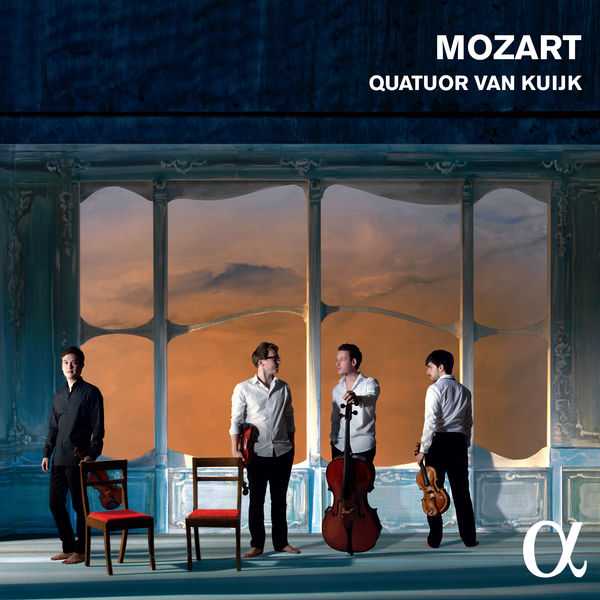

Composer: Wolfgang Amadeus Mozart
Performer: Quatuor Van Kuijk
Format: FLAC (tracks)
Label: Alpha
Catalogue: ALPHA246
Release: 2016
Size: 1.2 GB
Recovery: +3%
Scan: yes
String Quartet no. 16 in e-flat major, K. 428
01. I. Allegro non troppo
02. II. Andante con moto
03. III. Menuetto (Allegro – Trio)
04. IV. Allegro vivace
Divertimento in D Major, K. 136
05. I. Allegro
06. II. Andante
07. III. Presto
String Quartet No. 19 in C Major, K. 465 “Dissonance”
08. I. Adagio – Allegro
09. II. Andante cantabile
10. III. Menuetto (Allegro – Trio)
11. IV. Allegro molto
Despite its Dutch-sounding name, the quartet founded by Nicolas Van Kuijk in 2012 is French. But its short career is already international. The Quatuor Van Kuijk won First Prize in the 2015 Wigmore Hall Competition and First Prize and Audience Award at the Trondheim International Chamber Competition, and its members have been named BBC New Generation Artists until 2017. It has also been distinguished by the Academy of the Festival d’Aixen-Provence, and it is in the framework of the latter’s partnership with Alpha Classics that it has recorded this programme. Mozart is obviously the ideal composer to forge a link between chamber music and opera, the raison d’être of the Aix Festival. This programme combines an impish divertimento by the youthful Mozart of 1772 with two mature quartets composed around 1782, including the famous ‘Dissonance’ Quartet with its eminently dramatic opening. Nowhere else in Mozart’s quartets do theatre and counterpoint form such a happy pairing. Praised by The Guardian for its ‘style, energy, and a sense of risk’, the QVK is one of the most promising chamber groups of the new generation. Alpha is proud to accompany it for several recording projects.
Shortly after he arrived in Vienna in 1782, Wolfgang Amadeus Mozart began composing his six “Haydn” Quartets, inspired by recent contact with his new friend, Franz Joseph Haydn. Not only had Haydn composed an important set of string quartets in 1781, which Mozart studied closely, he also played violin in a quartet with Mozart as violist. These influences led Mozart to compose his String Quartet No. 16 in E flat major, K. 428, and his String Quartet No. 19 in C major, K. 465, “Dissonant,” which bookend the Divertimento in D major, K. 136, on this 2016 release from Alpha Classics. The Quatuor Van Kuijk, a French string quartet in spite of its Dutch name, deliver exciting and engaging performances of the string quartets, finding the right blend of flashiness and warmth that characterize Mozart’s newfound maturity. Yet the youthful Divertimento is treated with comparable brilliance, if slightly less ardor, and all three works make a delightful program, showing important aspects of the development of the Classical style. The recordings are focused and detailed, though the acoustics of Queen Elisabeth Music Chapel in Waterloo create an aural halo that at times softens the Quatuor Van Kuijk’s edge.



